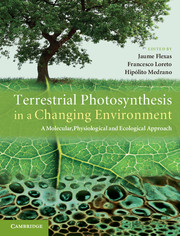 Terrestrial Photosynthesis in a Changing Environment
Terrestrial Photosynthesis in a Changing Environment Book contents
- Frontmatter
- Contents
- List of contributors
- Preface
- Acknowledgements
- List of abbreviations
- 1 Terrestrial photosynthesis in a changing environment
- Part I Photosynthesis
- Part II Measuring photosynthesis
- Part III Photosynthetic response to single environmental factors
- Part IV Photosynthesis in time
- Part V Photosynthesis in space
- Part VI Photosynthesis in a global context
- References
- Index
Preface
Published online by Cambridge University Press: 05 March 2013
- Frontmatter
- Contents
- List of contributors
- Preface
- Acknowledgements
- List of abbreviations
- 1 Terrestrial photosynthesis in a changing environment
- Part I Photosynthesis
- Part II Measuring photosynthesis
- Part III Photosynthetic response to single environmental factors
- Part IV Photosynthesis in time
- Part V Photosynthesis in space
- Part VI Photosynthesis in a global context
- References
- Index
Summary
Preface
Photosynthesis is the physiological process that overwhelmingly supports the Earth’s primary production. For this reason, photosynthesis research has attracted interest worldwide since the earliest foundations of modern science several centuries ago. Renewed interest in photosynthesis research has been spurred in recent decades. In part this is owing to the impressive technological advancements in analysing the molecular and physiological bases of the photosynthetic processes. But interest in photosynthesis also derives from the need to know how global climate change will impact on the primary productivity of the globe, and on ecosystem stability. Being a highly dynamic process, the precise understanding of how photosynthesis responds to environmental changes is crucial to predict how single plants and entire agro- or ecosystems will be affected in a scenario of rising CO2, rising temperature, and large disturbances in water and nutrient cycles. Finally, photosynthesis studies are the cornerstone for the development of new crops better suited for novel purposes, primarily high yield for biomass and biofuel use.
Whereas several books have proficiently addressed the photosynthetic process, the recent important advances in photosynthesis are still in need of comprehensive coverage. To mention just a few: new techniques have been tested for remote sensing of photosynthesis; important limitations of traditional gas-exchange analysis have been highlighted and solutions proposed; advances have been made in the measurements of diffusive resistance of CO2 inside leaves; the mechanistic knowledge of leaf mesophyll conductance to CO2 has been identified as a decisive but often neglected aspect of leaf photosynthetic; an increasing interest has arisen regarding photosynthetic responses to biotic stresses, a field that has been under-explored or totally unrecognised; photosynthetic responses under leaf development and ontogeny have been assessed; evolutionary trends have been described for several photosynthesis-related processes, such as leaf morphology or stomatal responses to environmental cues; and of course, large-scale studies have been performed regarding photosynthesis at ecosystem level, and the response of ecosystems to climate change.
- Type
- Chapter
- Information
- Terrestrial Photosynthesis in a Changing EnvironmentA Molecular, Physiological, and Ecological Approach, pp. xi - xiiPublisher: Cambridge University PressPrint publication year: 2012


